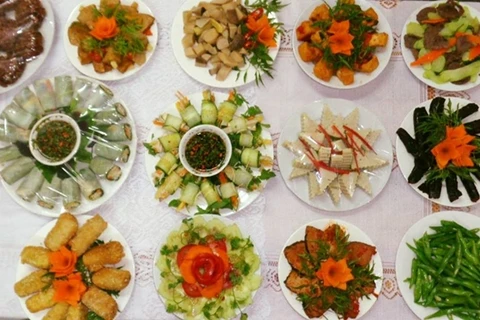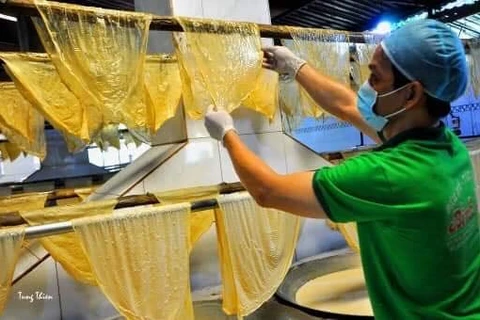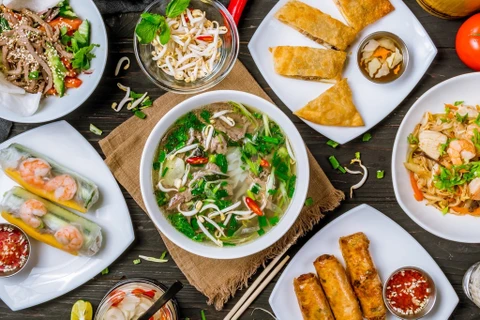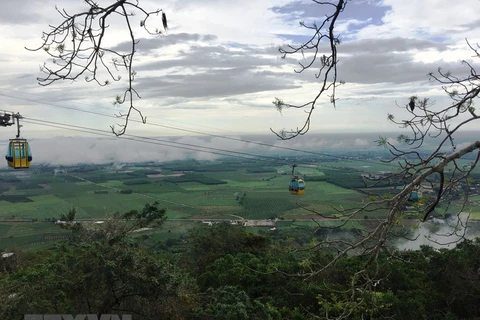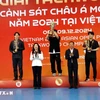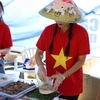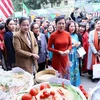 The vegetarian menu in Tay Ninh is richer than in many other places and is creatively processed and looks like a savoury dish. (Photo: dulichtayninh)
The vegetarian menu in Tay Ninh is richer than in many other places and is creatively processed and looks like a savoury dish. (Photo: dulichtayninh) Hanoi (VNA) – From their habit of enjoying vegetarian dishes, locals in the southwestern province of Tay Ninh have creatively made attractive vegetarian food and turned it into an art.
Through 180 years of formation and development, Tay Ninh has formed a unique and typical culinary culture, especially vegetarian food.
Tay Ninh is home to 127 pagodas and Buddhist worshipping facilities. Buddhists often have vegetarian food on the first and 15th days of each lunar month.
The province is also considered the cradle of the Cao Dai religion, and vegetarianism is one of the regulations for Cao Dai followers.
According to the old custom, Cao Dai people believe that January is their fasting month, and since then, the profession of cooking traditional vegetarian dishes has been respected and famous.
They go vegan every month for 10 days on the 1st, 8th, 14th, 15th, 18th, 23rd, 24th, 28th, 29th, and 30th days of the lunar month. In months that have 29 days, they will take the 27th day as an additional vegan day. Previously, on vegan days, Long Hoa, a major local market, sold nothing but vegetarian food.
Religions and beliefs have made considerable contributions to the culinary culture of Tay Ninh. The art of making vegetarian food has been spread to the community, creating the uniqueness of Tay Ninh cuisine.
In the province, there are many families that are famous for their tradition of making vegetarian food to serve at parties, weddings and special events. The most famous name is Trai Duong which is always crowded with Buddhist followers.
The vegetarian menu in Tay Ninh is richer than in many other places and is creatively processed and looks like a savoury dish. Ingredients for vegetarian dishes are diverse from typical products to common foods such as tofu, mushrooms, bananas, potatoes, flour, vegetables, fruits, salt, soy sauce, seasoning vegetables and other spices. From the ingredients, vegetarian culinary artists can turn dishes into art works.
Vegetarian porridge is one of the dishes that best reflects the art of vegetarian cuisine in Tay Ninh, which is rich in the colours of the ingredients and has the effect of balancing yin and yang (sweet-bitter, cold-heat), and nutrition.
Vegetables used in the dishes, which are gathered from mountains and rivers, are also rich in both kinds and taste in harmonious combination. Particularly, there are many special dishes from the trees and fruits of banana, jackfruit and papaya.
At weddings or festivals, vegetarian dishes are raised to an artistic level with elaborate processing and artistic presentation, which is a combination of five flavours: sour, spicy, salty, bitter, and sweet.
Particularly, during the traditional New Year days, many families in Tay Ninh offer vegetarian dishes to their ancestors and pray for their family's peace and happiness. The vegetarian Tet trays, especially that on the first day of the Lunar New Year, are made very sophisticatedly, meticulously, beautifully and with more delicious dishes than usual.
Tay Ninh's vegetarian cuisine has not only satisfied the spiritual, religious and health needs of the people, but also showed the creativity and tradition inheritance of artisans, evoking the people's love for nature, and driving the people to good things. The art of vegetarian cuisine in Tay Ninh, with a system of vegetarian restaurants and a vegetarian market, has contributed to the development of the local economy, attracting and popularising the local culture to tourists from all over the world.
With its great values, the art of making vegetarian food in Tay Ninh province has been recognised as a national intangible heritage following the Minister of Culture, Sports and Tourism’s decision No. 75/QD-BVHTTDL issued on January 12, 2022./.
